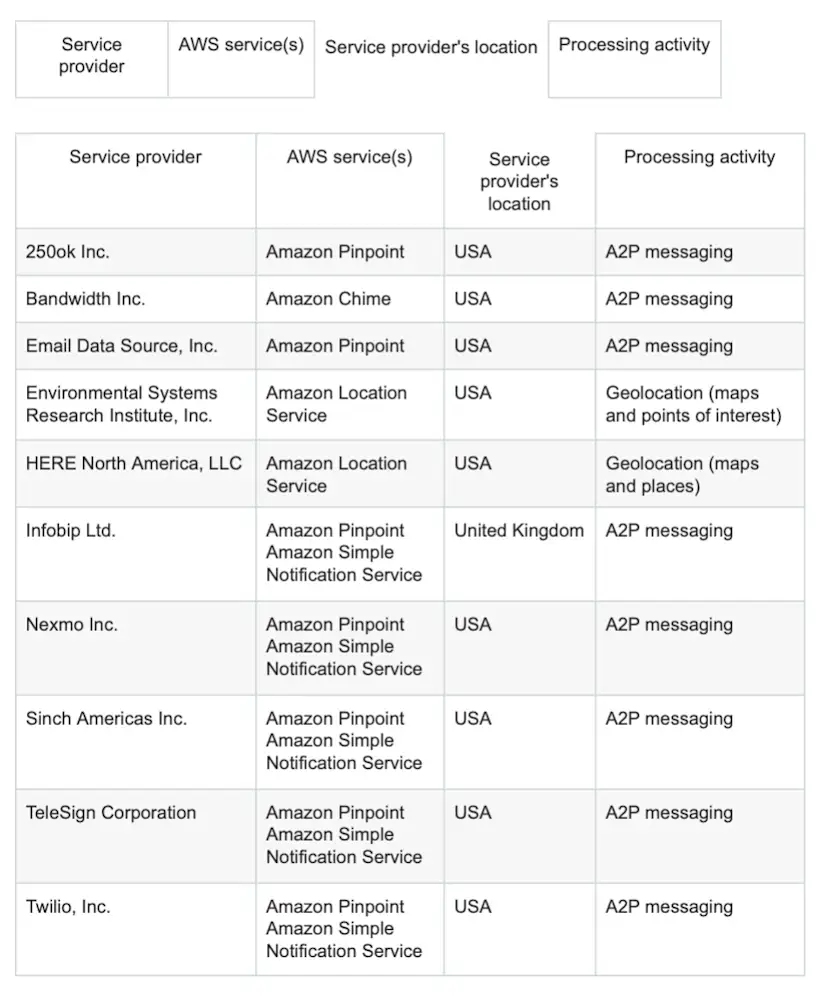STANDARD CONTRACTUAL CLAUSES
STANDARD CONTRACTUAL CLAUSES
For the purposes of Article 28(3) of Regulation 2016/679 (the "GDPR")
between
Customer (as defined in the Agreement)
(the "data controller")
and
ZeroNorth A/S
CVR 41052236
Amagerfælledvej 106, 4th floor
2300 Copenhagen
Denmark
(the "data processor")
each a 'party'; together 'the parties'
HAVE AGREED on the following Contractual Clauses (the Clauses) in order to meet the requirements of the GDPR and to ensure the protection of the rights of the data subject.
1. TABLE OF CONTENTS
1 TABLE OF CONTENTS
2 PREAMBLE
3 THE RIGHTS AND OBLIGATIONS OF THE DATA CONTROLLER
4 THE DATA PROCESSOR ACTS ACCORDING TO INSTRUCTIONS
5 CONFIDENTIALITY
6 SECURITY OF PROCESSING
7 USE OF SUB-PROCESSORS
8 TRANSFER OF DATA TO THIRD COUNTRIES OR INTERNATIONAL
ORGANISATIONS
9 ASSISTANCE TO THE DATA CONTROLLER
10 NOTIFICATION OF PERSONAL DATA BREACH
11 ERASURE AND RETURN OF DATA
12 AUDIT AND INSPECTION
13 THE PARTIES' AGREEMENT ON OTHER TERMS
14 COMMENCEMENT AND TERMINATION
15 DATA CONTROLLER AND DATA PROCESSOR CONTACTS/CONTACT POINTS
2. PREAMBLE
2.1 These Contractual Clauses (the Clauses) set out the rights and obligations of the data controller and the data processor, when processing personal data on behalf of the data controller.
2.2 The Clauses have been designed to ensure the parties' compliance with Article 28(3) of Regulation 2016/679 of the European Parliament and of the Council of 27 April 2016 on the protection of natural persons with regard to the processing of personal data and on the free movement of such data and repealing Directive 95/46/EC (General Data Protection Regulation).
2.3 "Personal data" means any information relating to an identified or identifiable natural person, see article 4(1) GDPR. If other confidential information than personal data is processed for the purpose of fulfilling the Clauses, e.g. information considered confidential according to the Danish Financial Business Act, any reference to "personal data" shall include this other confidential information.
2.4 In the context of the provision of the Solution(s) (as defined in the Agreement), the data processor will process personal data on behalf of the data controller in accordance with the Clauses.
2.5 The Clauses shall take priority over any similar provisions contained in other agreements between the parties. If additional obligations have been imposed on the data processor by other agreements between the parties, for example by standard contractual clauses pursuant to Article 46 (2) (c) and (d), these obligations shall apply in addition to the Clauses.
2.6 Four appendices are attached to the Clauses and form an integral part of the Clauses.
2.7 Appendix A contains details about the processing of personal data, including the purpose and nature of the processing, type of personal data, categories of data subject and duration of the processing.
2.8 Appendix B contains the data controller's conditions for the data processor's use of sub-processors and a list of sub-processors authorised by the data controller.
2.9 Appendix C contains the data controller's instructions with regards to the processing of personal data, the minimum security measures to be implemented by the data processor and how audits of the data processor and any sub-processors are to be performed.
2.10 Appendix D contains provisions for other activities which are not covered by the Clauses.
2.11 The Clauses along with appendices shall be retained in writing, including electronically, by both parties.
2.12 The Clauses shall not exempt the data processor from obligations to which the data processor is subject pursuant to the General Data Protection Regulation (the GDPR) or other legislation.
3. THE RIGHTS AND OBLIGATIONS OF THE DATA CONTROLLER
3.1 The data controller is responsible for ensuring that the processing of personal data takes place in compliance with the GDPR (see Article 24 GDPR), the applicable EU or Member State[1] data protection provisions and the Clauses.
3.2 The data controller has the right and obligation to make decisions about the purposes and means of the processing of personal data.
3.3 The data controller shall be responsible, among other, for ensuring that the processing of personal data, which the data processor is instructed to perform, has a legal basis.
4. THE DATA PROCESSOR ACTS ACCORDING TO INSTRUCTIONS
4.1 The data processor shall process personal data only on documented instructions from the data controller, unless required to do so by Union or Member State law or other law to which the processor is subject, cf. Clause 4.2. The data processor shall inform the data controller in writing of that legal requirement before processing, unless that law prohibits such information on important grounds of public interest.
4.2 The data processor may with regards to "other law" only derogate from these Clauses if required to do so by other law to which the data processor is subject by virtue of being established in the third country, and if this other law is unlikely to have a substantial adverse effect on the rights and freedoms of the data subjects.
4.3 Such instructions shall be specified in appendices A and C. Subsequent instructions can also be given by the data controller throughout the duration of the processing of personal data, but such instructions shall always be documented and kept in writing, including electronically, in connection with the Clauses.
4.4 The data processor shall immediately inform the data controller in writing if instructions given by the data controller, in the opinion of the data processor, contravene the GDPR, the applicable EU or Member State data protection provisions or other law to which the processor is subject.
4.5 The data processor is - as part of the instructions form the data controller - entitled to anonymise personal data, and to process such anonymised data for the data processor's own purposes.
5. CONFIDENTIALITY
5.1 The data processor shall keep the personal data confidential.
5.2 The data processor shall only grant access to the personal data being processed on behalf of the data controller to persons under the data processor's authority who have committed themselves to confidentiality or are under an appropriate statutory obligation of confidentiality and only on a need to know basis. The list of persons to whom access has been granted shall be kept under periodic review. On the basis of this review, such access to personal data shall be withdrawn, if access is no longer necessary, and personal data shall consequently not be accessible anymore to those persons.
5.3 The data processor shall at the request of the data controller demonstrate that the concerned persons under the data processor's authority are subject to the abovementioned confidentiality.
5.4 The data controller shall equally keep information received from the data processor confidential and may not use or disclose such information without authorisation.
6. SECURITY OF PROCESSING
6.1 Article 32 GDPR stipulates that, taking into account the state of the art, the costs of implementation and the nature, scope, context and purposes of processing as well as the risk of varying likelihood and severity for the rights and freedoms of natural persons, the data controller and data processor shall implement appropriate technical and organisational measures to ensure a level of security appropriate to the risk.
The data controller shall evaluate the risks to the rights and freedoms of natural persons inherent in the processing and implement measures to mitigate those risks. Depending on their relevance, the measures may include the following:
a) Pseudonymisation and encryption of personal data;
b) the ability to ensure ongoing confidentiality, integrity, availability and resilience of processing systems and services;
c) the ability to restore the availability and access to personal data in a timely manner in the event of a physical or technical incident;
d) a process for regularly testing, assessing and evaluating the effectiveness of technical and organisational measures for ensuring the security of the processing.
6.2 According to Article 32 GDPR, the data processor shall also – independently from the data controller – evaluate the risks to the rights and freedoms of natural persons inherent in the processing activity entrusted to it by the data controller and implement measures to mitigate those risks. To this effect, the data controller shall provide the data processor with all information necessary to identify and evaluate such risks.
6.3 Furthermore, the data processor shall assist the data controller in ensuring compliance with the data controller's obligations pursuant to Articles 32 GDPR, by inter alia providing the data controller with information concerning the technical and organisational measures already implemented by the data processor pursuant to Article 32 GDPR along with all other information necessary for the data controller to comply with the data controller's obligation under Article 32 GDPR.
If subsequently – in the assessment of the data controller – mitigation of the identified risks require further measures to be implemented by the data processor, than those already implemented by the data processor pursuant to Article 32 GDPR, the data controller shall specify these additional measures to be implemented in Appendix C.
7. USE OF SUB-PROCESSORS
7.1 The data processor shall meet the requirements specified in Article 28(2) and (4) GDPR in order to engage another processor (a sub-processor).
7.2 The data processor shall therefore not engage another processor (sub-processor) for the fulfilment of the Clauses without the prior general written authorisation of the data controller.
7.3 The data processor has the data controller's general authorisation for the engagement of sub-processors. The data processor shall inform in writing the data controller of any intended changes concerning the addition or replacement of sub-processors at least 30 days in advance, thereby giving the data controller the opportunity to object to such changes prior to the engagement of the concerned sub-processor(s). The data controller may only object to the use of a sub-processor if specific data protection issues related to the intended use of the sub-processor may constitute a violation of the data controller's obligations under applicable EU or Member State data protection provisions. The data processor must notify the data controller in writing upon termination of the use of a sub-processor. Longer time periods of prior notice for specific sub-processing services can be provided in Appendix B. The list of sub-processors already authorised by the data controller can be found in Appendix B.
7.4 Where the data processor engages a sub-processor for carrying out specific processing activities on behalf of the data controller, the same data protection obligations as set out in the Clauses shall be imposed on that sub-processor by way of a contract or other legal act under EU or Member State law, in particular providing sufficient guarantees to implement appropriate technical and organisational measures in such a manner that the processing will meet the requirements of the Clauses and the GDPR.
7.5 If the data processor engages or intends to engage a sub-processor for carrying out specific processing activities on behalf of the data controller, the data processor shall aim to impose on that sub-processor the same data protection obligations as set forth in these Clauses. If it, despite the data processor's efforts in good faith to do so, is not possible to impose these same obligations on the sub-processor, the data processor shall, as part of the submission required pursuant to Clause 7.3, notify the data controller hereof and submit the data protection-relevant parts of the data processor's agreement with the sub-processor to the data controller, cf. also Clause 7.9.
7.6 The data controller acknowledges and accepts that these Clauses under the circumstances referred to in Clause 7.5, do not impose further data protection obligations on the data processor than those set out in the submitted agreement between the data processor and sub-processor. The data controller also acknowledges and accepts that the data controller may only object to the use of a sub-processor if specific data protection issues related to the intended use of the sub-processor may constitute a violation of the data controller's obligations under applicable EU or Member State data protection provisions, cf. Clause 7.3.
7.7 Clause 7.5 and 7.6 also applies to the data controller's authorisation of the sub-processors listed in Appendix B at the time of conclusion of these Clauses.
7.8 The data processor shall therefore be responsible for requiring that the sub-processor at least complies with the obligations to which the data processor is subject pursuant to the Clauses, including Clause 7.5, 7.6 and 7.7, and the GDPR.
7.9 A copy of such a sub-processor agreement and subsequent amendments shall – at the data controller's request – be submitted to the data controller, thereby giving the data controller the opportunity to ensure that the same data protection obligations as set out in the Clauses are imposed on the sub-processor. Clauses on business related issues that do not affect the legal data protection content of the sub-processor agreement, shall not require submission to the data controller.
7.10 The data processor shall agree a third-party beneficiary clause with the sub-processor where – in the event of bankruptcy of the data processor – the data controller shall be a third-party beneficiary to the sub-processor agreement and shall have the right to enforce the agreement against the sub-processor engaged by the data processor, e.g. enabling the data controller to instruct the sub-processor to delete or return the personal data.
7.11 If the sub-processor does not fulfil his data protection obligations, the data processor shall remain fully liable to the data controller as regards the fulfilment of the obligations of the sub-processor. This does not affect the rights of the data subjects under the GDPR – in particular those foreseen in Articles 79 and 82 GDPR – against the data controller and the data processor, including the sub-processor.
8. TRANSFER OF DATA TO THIRD COUNTRIES OR INTERNATIONAL ORGANISATIONS
8.1 Any transfer of personal data to third countries or international organisations by the data processor shall only occur on the basis of documented instructions from the data controller and shall always take place in compliance with Chapter V GDPR.
8.2 In case transfers to third countries or international organisations, which the data processor has not been instructed to perform by the data controller, is required under EU or Member State law or other law, to which the data processor is subject, the data processor shall inform the data controller in writing of that legal requirement prior to processing unless that requirement prohibits such information on important grounds of public interest.
8.3 Without documented instructions from the data controller or a specific requirement under EU or Member State law or other law to which the data processor is subject, the data processor cannot within the framework of the Clauses:
a) transfer personal data to a data controller or a data processor in a third country or in an international organization
b) transfer the processing of personal data to a sub-processor in a third country
c) have the personal data processed in by the data processor in a third country
8.4 The data controller's instructions regarding the transfer of personal data to a third country including, if applicable, the transfer tool under Chapter V GDPR on which they are based, shall be set out in Appendix C.6.
8.5 Subject to the data processor's compliance with Clauses 7 and 8, including the instructions in Appendix C.6, the data controller hereby authorises the data processor to establish a legal basis for transfers of personal data to third countries and organisations outside the EEA on behalf of and in the name of the data controller, including entering into standard data protection clauses within the meaning of Article 46(2)(c) and (d) GDPR. The data processor is entitled to assign its rights under this Clause to sub-processors, whereas sub-processors may then on behalf of the data controller establish a legal basis for transfer of personal data to third countries and organisations outside the EEA, which includes entering into standard data protection clauses within the meaning of Article 46(2)(c) and (d) GDPR.
8.6 The Clauses shall not be confused with standard data protection clauses within the meaning of Article 46(2)(c) and (d) GDPR, and the Clauses cannot be relied upon by the parties as a transfer tool under Chapter V GDPR.
9. ASSISTANCE TO THE DATA CONTROLLER
9.1 Taking into account the nature of the processing, the data processor shall assist the data controller by appropriate technical and organisational measures, insofar as this is possible, in the fulfilment of the data controller's obligations to respond to requests for exercising the data subject's rights laid down in Chapter III GDPR.
This entails that the data processor shall, insofar as this is possible, assist the data controller in the data controller's compliance with:
a) the right to be informed when collecting personal data from the data subject
b) the right to be informed when personal data have not been obtained from the data subject
c) the right of access by the data subject
d) the right to rectification
e) the right to erasure ('the right to be forgotten')
f) the right to restriction of processing
g) notification obligation regarding rectification or erasure of personal data or restriction of processing
h) the right to data portability
i) the right to object
j) the right not to be subject to a decision based solely on automated processing, including profiling
9.2 In addition to the data processor's obligation to assist the data controller pursuant to Clause 6.3., the data processor shall furthermore, taking into account the nature of the processing and the information available to the data processor, assist the data controller in ensuring compliance with:
a) the data controller's obligation to without undue delay and, where feasible, not later than 72 hours after having become aware of it, notify the personal data breach to the competent supervisory authority (set out in the Order), unless the personal data breach is unlikely to result in a risk to the rights and freedoms of natural persons;
b) the data controller's obligation to without undue delay communicate the personal data breach to the data subject, when the personal data breach is likely to result in a high risk to the rights and freedoms of natural persons;
c) the data controller's obligation to carry out an assessment of the impact of the envisaged processing operations on the protection of personal data (a data protection impact assessment);
d) the data controller's obligation to consult the competent supervisory authority (set out in the Order) prior to processing where a data protection impact assessment indicates that the processing would result in a high risk in the absence of measures taken by the data controller to mitigate the risk.
9.3 The parties shall define in Appendix C the appropriate technical and organisational measures by which the data processor is required to assist the data controller as well as the scope and the extent of the assistance required. This applies to the obligations foreseen in Clause 9.1. and 9.2.
10. NOTIFICATION OF PERSONAL DATA BREACH
10.1 In case of any personal data breach, the data processor shall, without undue delay after having become aware of it, notify the data controller of the personal data breach.
10.2 The data processor's notification to the data controller shall, if possible, take place within 48 hours after the data processor has become aware of the personal data breach to enable the data controller to comply with the data controller's obligation to notify the personal data breach to the competent supervisory authority, cf. Article 33 GDPR.
10.3 In accordance with Clause 9.2.a, the data processor shall assist the data controller in notifying the personal data breach to the competent supervisory authority, meaning that the data processor is required to assist in obtaining the information listed below which, pursuant to Article 33(3)GDPR, shall be stated in the data controller's notification to the competent supervisory authority:
a) the nature of the personal data including where possible, the categories and approximate number of data subjects concerned and the categories and approximate number of personal data records concerned;
b) the likely consequences of the personal data breach;
c) the measures taken or proposed to be taken by the controller to address the personal data breach, including, where appropriate, measures to mitigate its possible adverse effects.
10.4 The parties shall define in Appendix C all the elements to be provided by the data processor when assisting the data controller in the notification of a personal data breach to the competent supervisory authority.
11. ERASURE AND RETURN OF DATA
11.1 On termination of the provision of personal data processing services, the data processor shall be under obligation to delete all personal data processed on behalf of the data controller and certify to the data controller that it has done so unless Union or Member State law or other law to which the data processor is subject requires further storage of the personal data by the data processor.
12. AUDIT AND INSPECTION
12.1 The data processor shall make available to the data controller all information necessary to demonstrate compliance with the obligations laid down in Article 28 and the Clauses and allow for and contribute to audits, including inspections, conducted by the data controller or another auditor mandated by the data controller.
12.2 Procedures applicable to the data controller's audits, including inspections, of the data processor and sub-processors are specified in appendices C.7. and C.8.
12.3 The data processor shall be required to provide the supervisory authorities, which pursuant to applicable legislation have access to the data controller's and data processor's facilities, or representatives acting on behalf of such supervisory authorities, with access to the data processor's physical facilities on presentation of appropriate identification.
13. THE PARTIES' AGREEMENT ON OTHER TERMS
13.1 The parties may agree other clauses concerning the provision of the personal data processing service specifying e.g. liability, as long as they do not contradict directly or indirectly the Clauses or prejudice the fundamental rights or freedoms of the data subject and the protection afforded by the GDPR.
14. COMMENCEMENT AND TERMINATION
14.1 The Clauses shall become effective on the date of both parties' signature.
14.2 Both parties shall be entitled to require the Clauses renegotiated if changes to the law or inexpediency of the Clauses should give rise to such renegotiation.
14.3 The Clauses shall apply for the duration of the provision of personal data processing services. For the duration of the provision of personal data processing services, the Clauses cannot be terminated unless other Clauses governing the provision of personal data processing services have been agreed between the parties.
14.4 If the provision of personal data processing services is terminated, and the personal data is deleted or returned to the data controller pursuant to Clause 11.1. and Appendix C.4., the Clauses may be terminated by written notice by either party.
14.5 Signature
Signed together with the Order.
15. DATA CONTROLLER AND DATA PROCESSOR CONTACTS/CONTACT POINTS
15.1 The parties may contact each other using the following contacts/contact points:
15.2 The parties shall be under obligation continuously to inform each other of changes to contacts/contact points.
The Customer's contact point is set out in the Order.
Data processor:
Name Bo Kristensen
Position Chief Technology Officer
Telephone + 45 8987 0210
E-mail bo.kristensen@zeronorth.com
Appendix A Information about the processing
A.1. The purpose of the data processor's processing of personal data on behalf of the data controller is:
The noon reports are submitted to and stored by ZeroNorth as part of ZeroNorth Solution(s) as defined in the Agreement. The software requires vessel crew to report on relevant data points. Personal data included in the noon reports that falls under this agreement is the following:
● Captain name
● Chief engineer name
● Chief officer name
● 2nd Engineer name
● Nautical officer name
A.2. The data processor's processing of personal data on behalf of the data controller shall mainly pertain to (the nature of the processing):
Storage of the personal data as part of the noon reports.
A.3. The processing includes the following types of personal data about data subjects:
"Name, job function and emails of the employees of the Customer.
A.4. Processing includes the following categories of data subject:
Customer's employees
A.5. The data processor's processing of personal data on behalf of the data controller may be performed when the Clauses commence. Processing has the following duration:
During the term of the Agreement with the Customer.
Appendix B Authorised sub-processors
B.1. Approved sub-processors
On commencement of the Clauses, the data controller authorises the engagement of the following sub-processors:
[1] References to "Member States" made throughout the Clauses shall be understood as references to "EEA Member States".

Please refer to attachment 1 for the full list of sub-processors and locations.
The data controller has on the effective date of the Clauses authorised the use of the abovementioned sub-processors for the processing described for that party. Subject to Clause 7, the data processor shall not be entitled to engage a sub-processor for a 'different' processing than the one which has been agreed upon or have another sub-processor perform the described processing. Furthermore, the data processor may not - subject to Clause 7 - process personal data on any other location(s) than the location(s) agreed upon above.
B.2. Prior notice for the authorisation of sub-processors:
30 days.
Appendix C Instruction pertaining to the use of personal data
C.1. The subject of/instruction for the processing
The data processor's processing of personal data on behalf of the data controller shall be carried out by the data processor performing the following:
- GDPR relevant data (vessel noon reports) is collected via our Vessel web application hosted at https://vessel.noonreport.app/. The individual devices aboard a vessel will have their own logins as well as using the vessel IMO. The authentication setup is the same as for the rest of ZeroNorth’s web applications (Auth0, SSO with Google )
- The responsible people aboard the vessel fill in the information in the web app, typically the chief engineer or the master. There are more than 300 data points in total to be reported. The relevant GDPR data points are:
● Captain’s name
● Chief engineer’s name
● Chief officer’s name
● 2nd Engineer’s name
● Nautical officer’s name
- The data is accessible visible on the ZN platform - same security as mentioned before. Only accessible to the users who have a login for the platform for that specific customer.
C.2. Security of processing
The level of security shall take into account:
Data is encrypted at all stages, in transit, at rest and in use.
Our software is designed and run according to our Information Security Management System (ISMS) which sets the requirements for confidentiality, availability and integrity.
Backups are encrypted and we have the ability to provision new environments and repopulate with data in case of incident.
Our platform is penetration tested by an Independent 3rd party at major release intervals and is assessed regularly for vulnerabilities.
Access to our software requires purchase of privisioned environment. Access to customer environments is agreed on setup and access is controlled via Auth0 and google SSO.
All data in transmission is encrypted.
Data at rest is also encrypted.
Our data resides in Amazon AWS data centres physically located in Ireland. The security of these data centres is in accordance with our ISMS.
All connections to and from systems are logged and alerts generated on thresholds or anomalies.
C.3. Assistance to the data controller
The data processor shall insofar as this is possible – within the scope and the extent of the assistance specified below – assist the data controller in accordance with Clause 9.1. and 9.2. by implementing the following technical and organisational measures:
The data processer will assist the data controller with e.g. answering requests from data subjects via the listed contact points in the Agreement.
C.4. Storage period/erasure procedures
"Personal data is stored during the term of the Agreement after which the personal data is automatically erased by the data processor.
Upon termination of the provision of personal data processing services, the data processor shall either delete or return the personal data in accordance with Clause 11.1., unless the data controller – after the signature of the contract – has modified the data controller's original choice. Such modification shall be documented and kept in writing, including electronically, in connection with the Clauses."
C.5. Processing location
Subject to Clause 7, processing of the personal data under the Clauses cannot be performed at other locations than the following:
Refer to the list in Annex B.1 above.
C.6. Instruction on the transfer of personal data to third countries
The data processor is hereby instructed to transfer the personal data to the sub-processors in the third countries that are set out in the list of locations in Appendix B.1. The data processor shall be free to choose a valid legal basis for transfer of personal data in accordance with Clause 8.5.
If the use of a new sub-processor necessitates the transfer of personal data to one or more processing locations in third countries or organisations outside the EEA, the data processor may not make use of such sub-processor for processing operations covered by these Clauses unless the data controller has provided the data processor with a prior written instruction to do so. The data controller is, with respect of Clause 7, required to provide the data processor with such instruction unless specific data protection issues related to the intended use of the sub-processor may constitute a violation of the data controller's obligations under applicable EU or Member State data protection provision.
C.7. Procedures for the data controller's audits, including inspections, of the processing of personal data being performed by the data processor
In addition to the audit report from Amazon (see C8), the data controller or the data controller's representative shall have a right to perform an annual physical inspection of the places, where the processing of personal data is carried out by the data processor, including physical facilities as well as systems used for and related to the processing to ascertain the data processor's compliance with the GDPR, the applicable EU or Member State data protection provisions and the Clauses.
In addition to the planned inspection, the data controller may perform an inspection of the data processor when the data controller deems it required.
The data controller's costs, if applicable, relating to physical inspection shall be defrayed by the data controller. The data processor shall, however, be under obligation to set aside the resources (mainly time) required for the data controller to be able to perform the inspection.
C.8. Procedures for audits, including inspections, of the processing of personal data being performed by sub-processors
Amazon Web Services
The data processor shall one time per year at Amazon's expense obtain an auditor's report from an independent third party concerning Amazon's compliance with the GDPR, the applicable EU or Member State data protection provisions and the Clauses.
The parties have agreed that the following types of auditor's report may be used in compliance with the Clauses:
● ISO27001
The auditor's report shall without undue delay be submitted to the data controller for information. The data controller may contest the scope and/or methodology of the report and may in such cases request a new audit/inspection under a revised scope and/or different methodology.
Based on the results of such an audit/inspection, the data controller may request further measures to be taken to ensure compliance with the GDPR, the applicable EU or Member State data protection provisions and the Clauses.
Attachment 1 - Sub-processors
ZeroNorth DPA Attachment 1, sub processors as part of Amazon AWS services.
Should we receive notification that any of these subprocessors change affecting the services we provision, we will notify customers of these changes.
1) AWS infrastructure entities
The AWS entities listed below provide the infrastructure on which the AWS services run (including AWS Regions and Edge Locations). For more information about AWS's cloud infrastructure, please see the AWS Global Infrastructure website. Where the AWS entity provides the infrastructure for an AWS Region, the AWS Region is listed below.
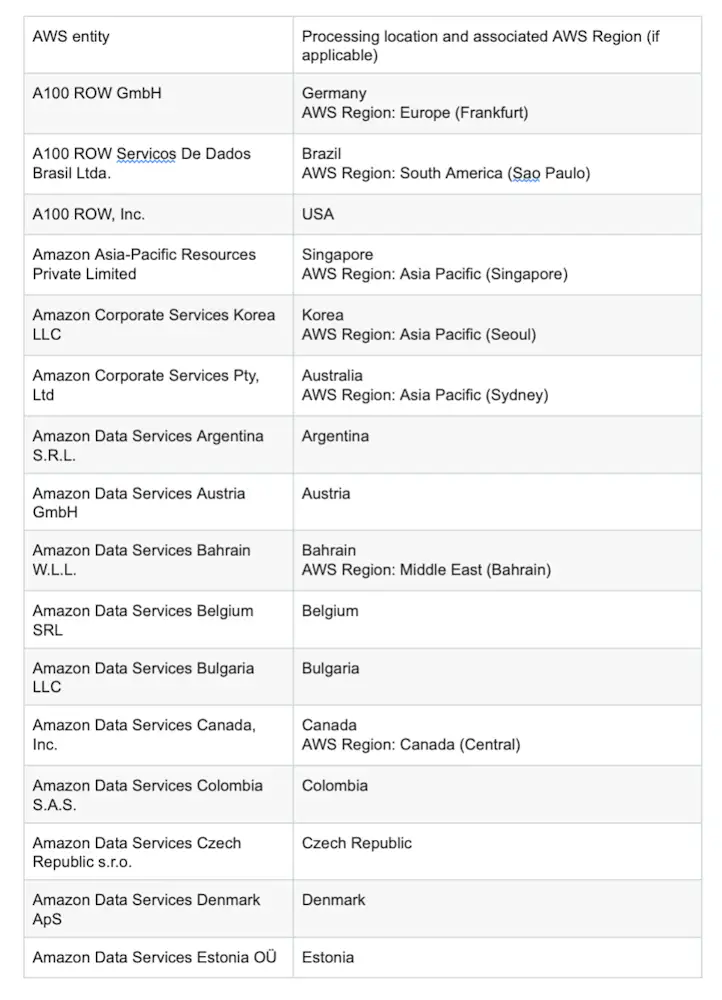
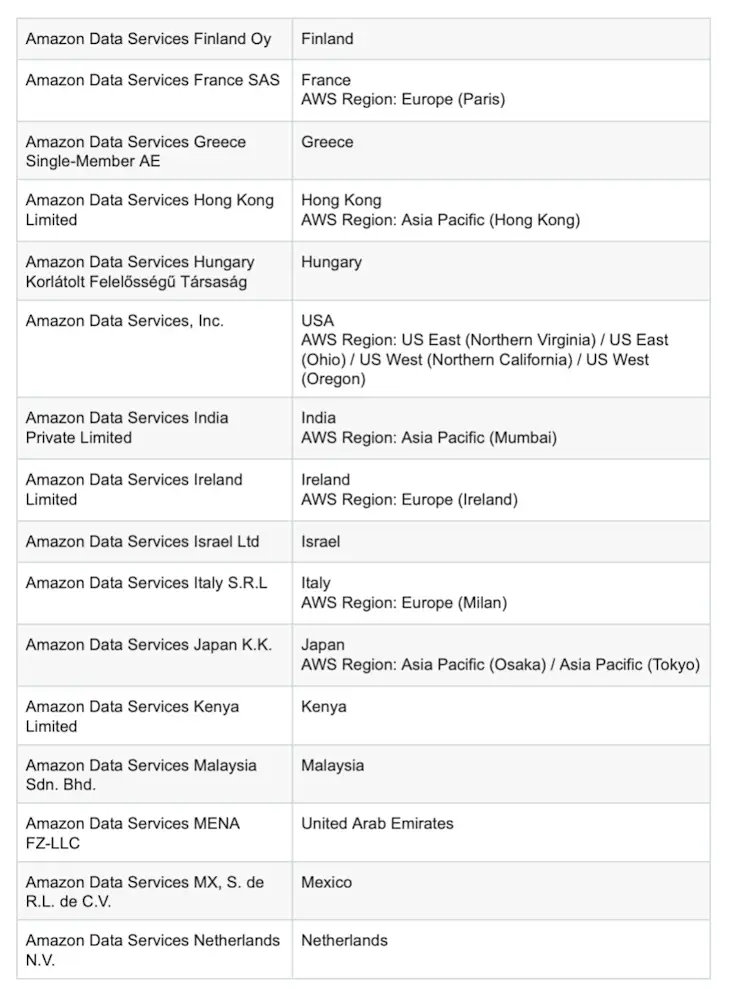
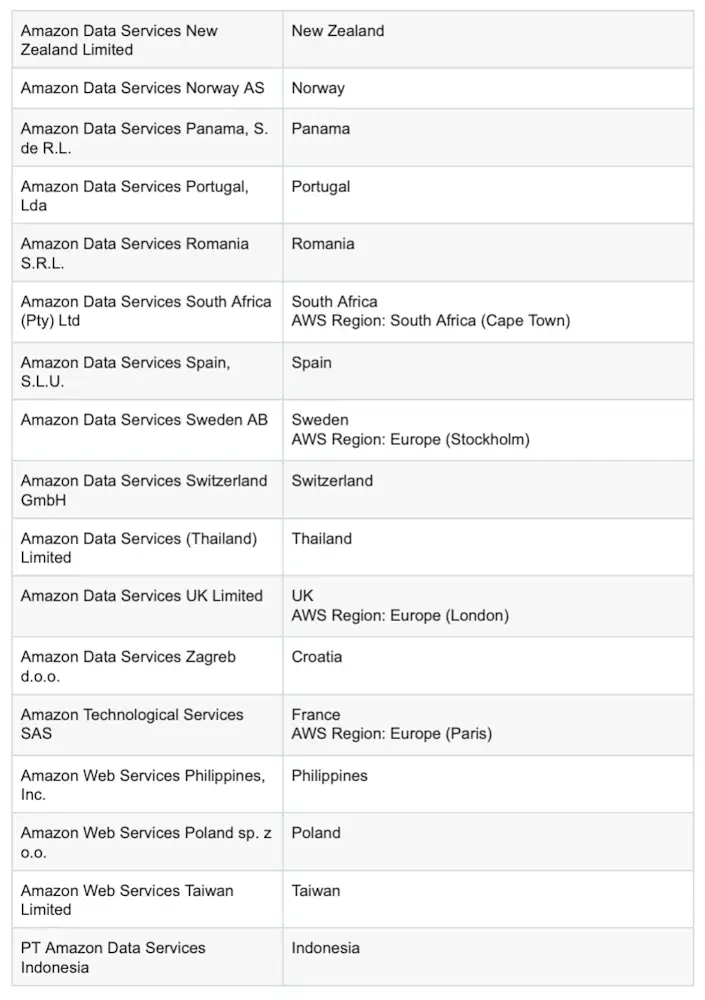

2) AWS service providers
The AWS entities listed below provide processing activities for specific AWS services. The processing activities provided by the AWS entities include selling and providing certain business application, application integration, and media services (application and media services), human transcription of voice recordings (transcription services), development and improvement of AWS services (service improvement), and/or customer-initiated support.
a) AWS entities selling and providing application and media services
The AWS entities that sell and provide application and media services are listed below along with the associated services. The processing location is the customer’s selected AWS Region(s), and the location of the customer’s end users.
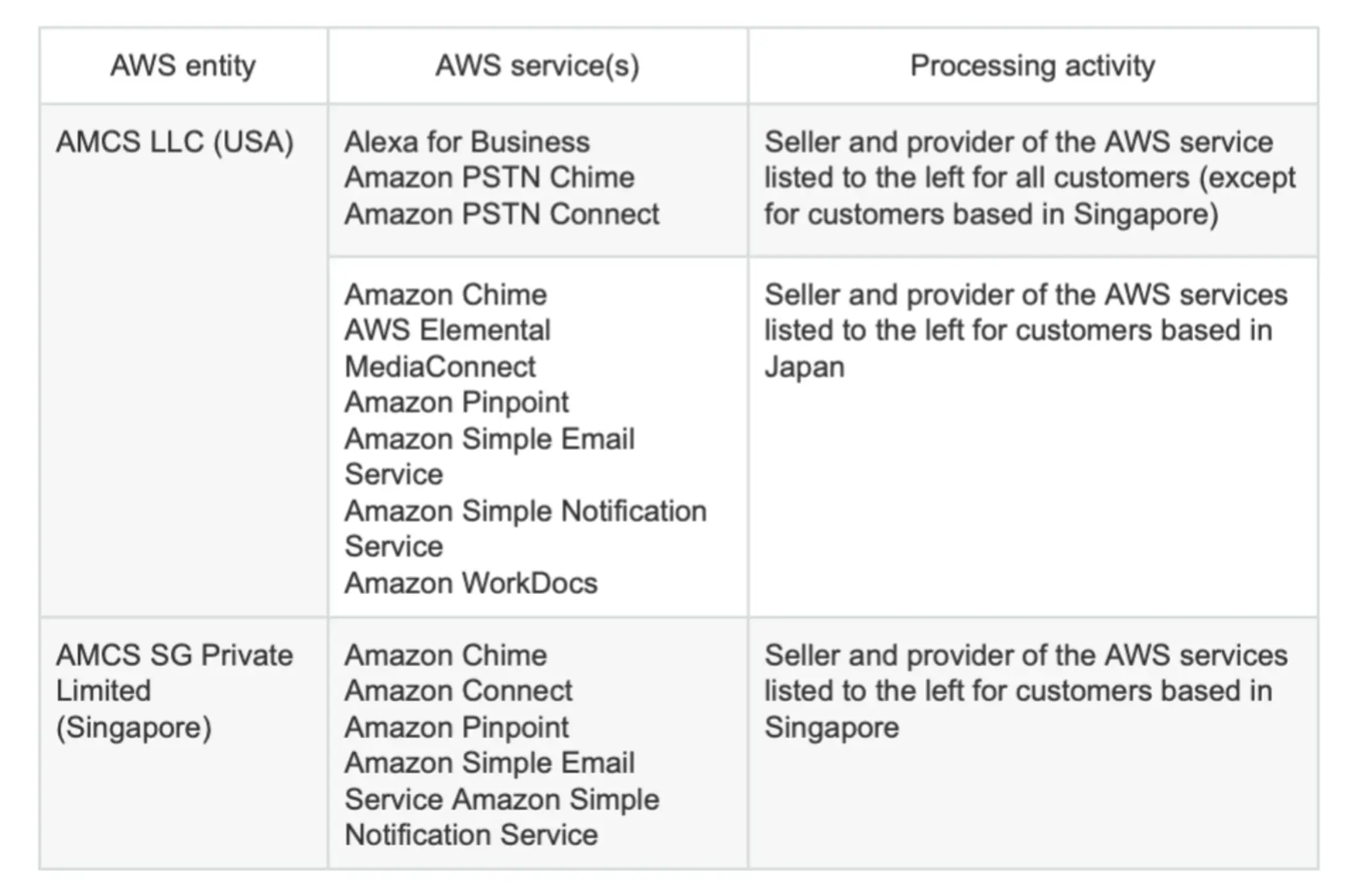
b) AWS entities providing transcription services and service improvement
Unless the customer opts out of AWS using Customer Data for service improvement, where permitted in accordance with the AWS Service Terms, the AWS entities listed below provide transcription services and service improvement for the applicable AWS services.
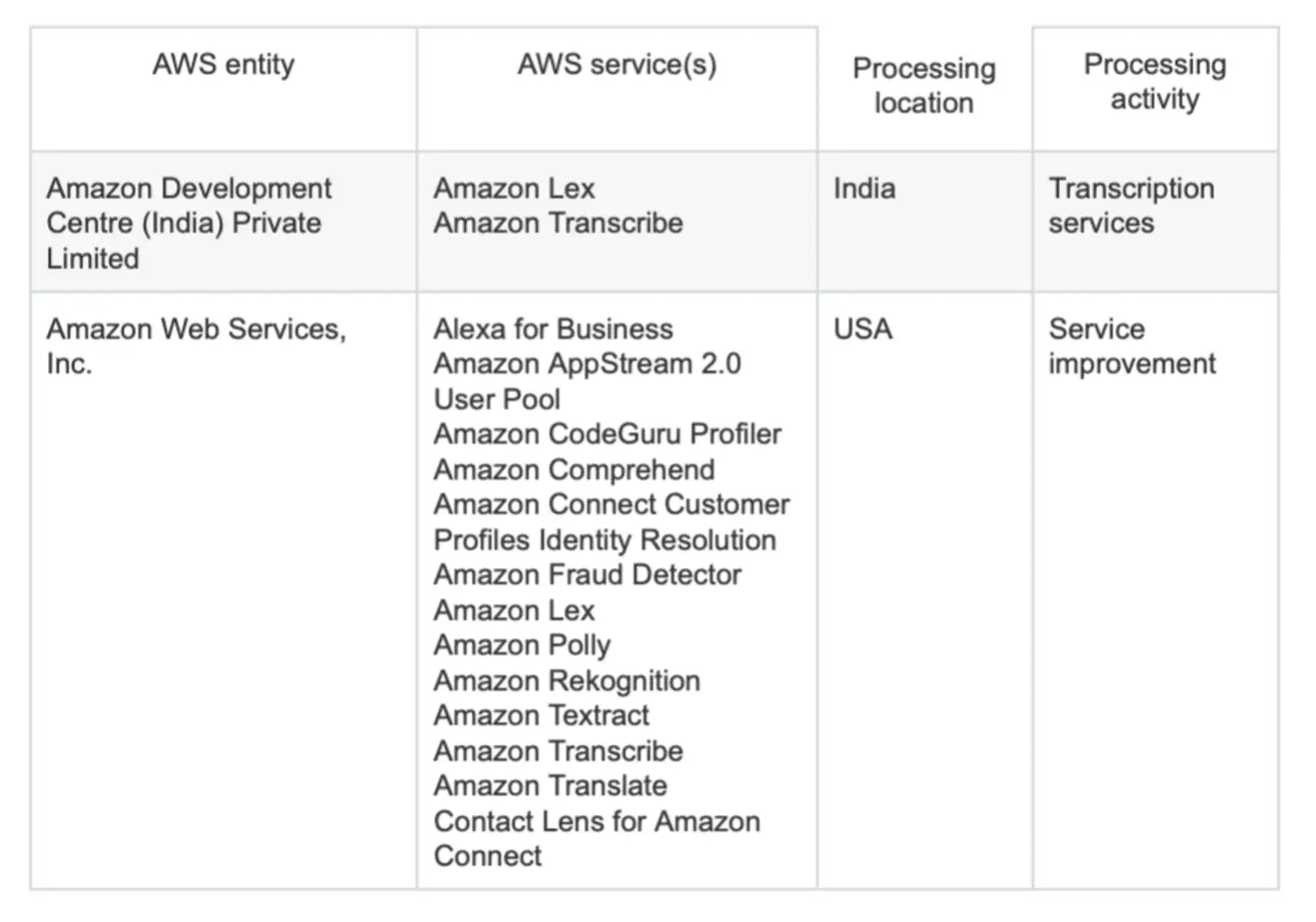
c) AWS entities providing customer-initiated support
The AWS entities listed below provide customer-initiated support. These entities do not process Customer Data unless the customer agrees to share Customer Data in the course of requesting support.
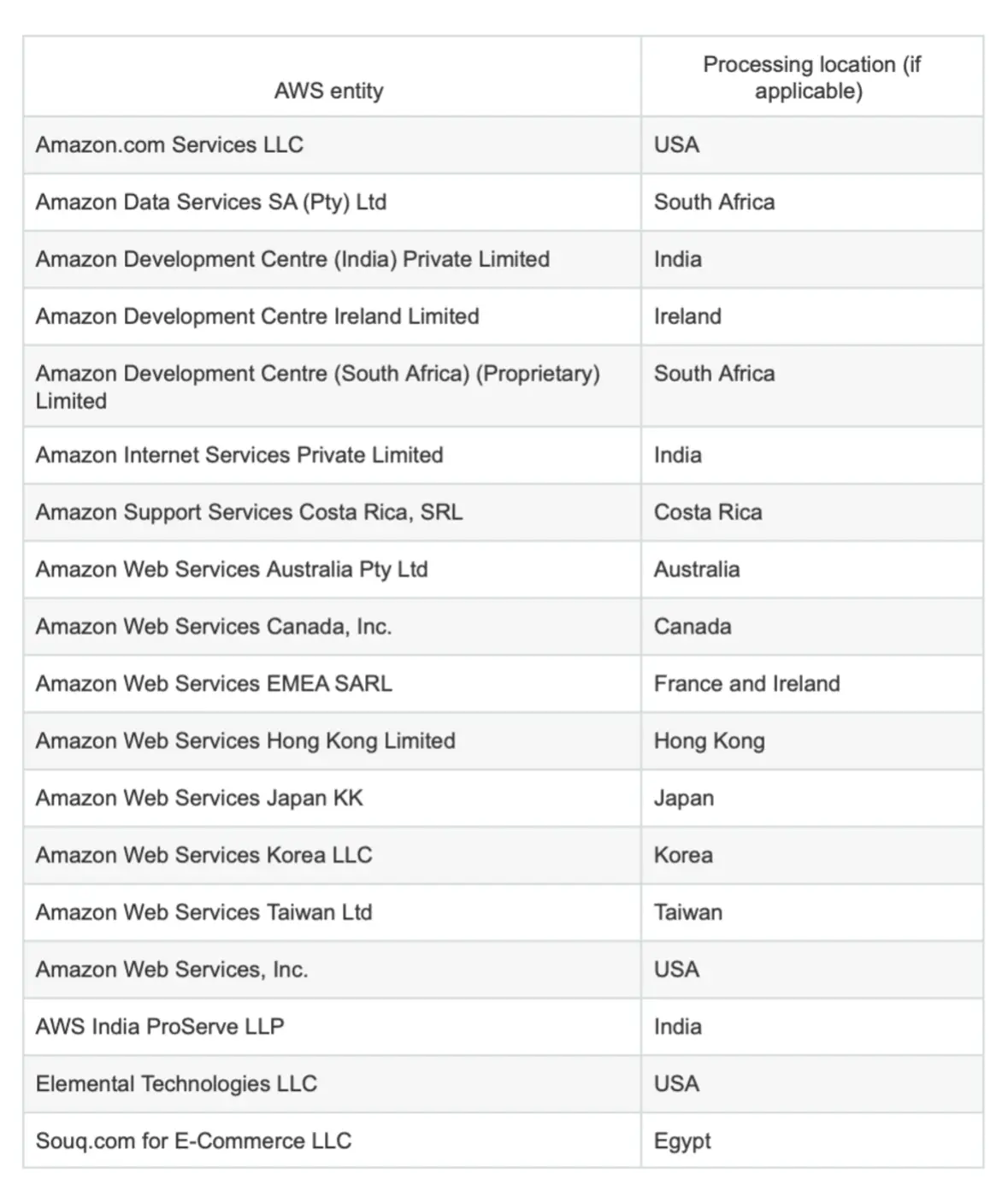
3) Third-party service providers
AWS has contracted with the following unaffiliated service providers for Application-to-Person (A2P) messaging services and geolocation services (such as maps or points of interest) for the AWS services described below. The processing location is the customer’s selected AWS Region(s), the service provider’s location listed below and/or the location of the customer’s end users.
Last Updated: September 3, 2021
